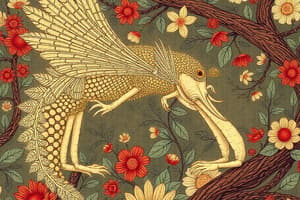Podcast
Questions and Answers
Which type of competition involves indirect competition for a shared resource?
Which type of competition involves indirect competition for a shared resource?
- Exploitative competition (correct)
- Mutualism
- Predation
- Interference competition
What type of relationship is characterized by one species feeding on another species?
What type of relationship is characterized by one species feeding on another species?
- Coexistence
- Competition
- Mutualism
- Predation (correct)
Which type of symbiosis involves both species benefiting?
Which type of symbiosis involves both species benefiting?
- Parasitism
- Commensalism
- Predation
- Mutualism (correct)
What type of relationship exists when different species coexist without harming or benefiting each other?
What type of relationship exists when different species coexist without harming or benefiting each other?
Which type of symbiosis involves one species benefiting and the other being neutral?
Which type of symbiosis involves one species benefiting and the other being neutral?
What type of relationship involves a close, long-term relationship between different species?
What type of relationship involves a close, long-term relationship between different species?
Which type of competition involves direct competition, where one individual interferes with another's access to the resource?
Which type of competition involves direct competition, where one individual interferes with another's access to the resource?
What type of relationship exists when one species benefits and the other is harmed?
What type of relationship exists when one species benefits and the other is harmed?
Which type of relationship is characterized by a predator-prey relationship within the same species?
Which type of relationship is characterized by a predator-prey relationship within the same species?
What type of relationship exists when one species attaches itself to another species for food scraps?
What type of relationship exists when one species attaches itself to another species for food scraps?
Flashcards are hidden until you start studying
Study Notes
Interspecific and Intraspecific Relations
Competition
- Occurs when two or more individuals or species compete for the same limited resource
- Can be interspecific (between different species) or intraspecific (within the same species)
- Types of competition:
- Exploitative competition: indirect competition for a shared resource
- Interference competition: direct competition, where one individual interferes with another's access to the resource
Predation
- A predator-prey relationship where one species (predator) feeds on another species (prey)
- Can be interspecific (between different species) or intraspecific (within the same species)
- Examples: lion-zebra, hawk-mouse
Mutualism
- A relationship where both species benefit
- Examples:
- Clownfish-anemone: clownfish gets protection, anemone gets cleaned
- Bees-flowers: bees get nectar, flowers get pollinated
Coexistence
- A neutral relationship where species exist together without harming or benefiting each other
- Examples:
- Different species of birds living in the same forest
- Different species of fish living in the same aquarium
Symbiosis
- A close, long-term relationship between different species
- Types of symbiosis:
- Mutualism (both species benefit)
- Commensalism (one species benefits, the other is neutral)
- Parasitism (one species benefits, the other is harmed)
Parental Care
- A behavior where parents invest time and energy in their offspring to increase their survival and reproductive success
- Examples:
- Birds building nests and feeding their young
- Mammals providing milk and protection to their young
Colony
- A group of individuals of the same species living together in a coordinated manner
- Examples:
- Ant colonies with different castes (workers, queens, soldiers)
- Bee colonies with a queen and worker bees
Commensalism
- A relationship where one species benefits and the other is neutral
- Examples:
- Remora fish attaching themselves to sharks for food scraps
- Bird species nesting on tree branches without harming the tree
State
- Not a type of interspecific or intraspecific relation, but rather a condition or status of an individual or population
- Examples:
- A population's state of growth, decline, or stability
- An individual's state of health, hunger, or reproduction
Interspecific and Intraspecific Relations
Competition
- Two or more individuals or species compete for the same limited resource
- Types of competition:
- Exploitative competition: indirect competition for a shared resource
- Interference competition: direct competition, where one individual interferes with another's access to the resource
Predation
- A predator-prey relationship where one species (predator) feeds on another species (prey)
- Examples: lion-zebra, hawk-mouse
Mutualism
- A relationship where both species benefit
- Examples:
- Clownfish-anemone: clownfish gets protection, anemone gets cleaned
- Bees-flowers: bees get nectar, flowers get pollinated
Coexistence
- A neutral relationship where species exist together without harming or benefiting each other
- Examples:
- Different species of birds living in the same forest
- Different species of fish living in the same aquarium
Symbiosis
- A close, long-term relationship between different species
- Types of symbiosis:
- Mutualism (both species benefit)
- Commensalism (one species benefits, the other is neutral)
- Parasitism (one species benefits, the other is harmed)
Parental Care
- A behavior where parents invest time and energy in their offspring to increase their survival and reproductive success
- Examples:
- Birds building nests and feeding their young
- Mammals providing milk and protection to their young
Colony
- A group of individuals of the same species living together in a coordinated manner
- Examples:
- Ant colonies with different castes (workers, queens, soldiers)
- Bee colonies with a queen and worker bees
Commensalism
- A relationship where one species benefits and the other is neutral
- Examples:
- Remora fish attaching themselves to sharks for food scraps
- Bird species nesting on tree branches without harming the tree
State
- A condition or status of an individual or population
- Examples:
- A population's state of growth, decline, or stability
- An individual's state of health, hunger, or reproduction
Studying That Suits You
Use AI to generate personalized quizzes and flashcards to suit your learning preferences.




